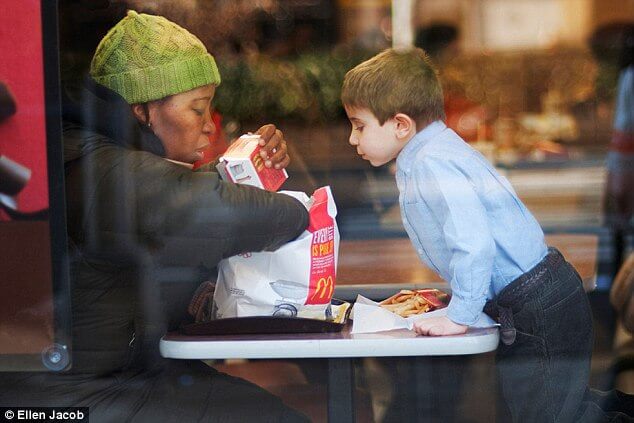The Problem with Nannies (And No, It’s Not the “Gazillionaires” Who Employ Them)


Photo: Ellen Jacob
I was waiting on line for coffee the other day and overheard two women talking. One was extolling the virtues of the area we were in by comparing it to neighboring Park Slope and saying that at least where we were the streets hadn’t been overtaken by strollers and what frequently seem to be feral toddlers. The other woman agreed, and then added, “Well, and you know all those strollers in Park Slope are being pushed by nannies. None of those kids are ever taken care of by their own parents.” It was at this point that my eyes rolled so far up into my head that I worried for a moment that one of my contact lenses would get stuck somewhere in my ocular cavity and stay there—forever out of reach of my fingers—before traveling throughout my body, a small, sliver of plastic moving aimlessly within my being. All of which is to say, I don’t really know how bodies work. But also? This talk about nannies pissed me off, what with the dual implications that not only are children who have nannies not ever taken care of by their own too-wealthy-for-words parents, but also that the care the nannies provide was somehow less than what a parent would give.
I was reminded of this conversation when I read a post on Flavorwire about a photographic series done by Ellen Jacob (first written about on The Culture) which documents the lives of New York City nannies. As inferred by the photo above (and more at the links), one of the issues highlighted in this series is the racial divide between many nannies and their charges. Jacob also “noted the disparity between the women’s value to the families they care for and the compensation they receive,” telling The Culture: “Mothers talk about how much they love these women and they’re part of the family yet when it comes to money they tend to be much more tight.” The plight of off-the-books workers like nannies, who are frequently (though by no means always) undocumented immigrants and who work for long hours without benefits like health insurance, overtime, or even guaranteed sick days is a topic that has come under a great deal of well-deserved scrutiny, and will hopefully continue to be examined with adjustments made to guarantee better working conditions for nannies around the city, but the implication that just all—or even most—of the families who have nannies knowingly and willfully underpay these women is troubling and, well, untrue.
Additionally, the introduction to the Flavorwire post bothered me and caused me to perform a repeat eye-roll (although, luckily, my contacts remain in place!) because of Tom Hawking’s opening sentence: “Nannies are one of those quintessential rich-person expenses—no one who earns less than a gazillion dollars a year would think of paying someone else to raise their children for them, but hey, nannies are nevertheless a common sight in NYC.” So, hold on a minute, because it seems like both Hawking and Jacob have a similar view to those women who stood on line waiting for $4 pour over coffee, which is that having a nanny is an extravagance that is not only evidence of extreme economic privilege (a gazillion dollars is a lot of money!), but is also a sign of parental negligence. After all, what kind of people would “[pay] someone else to raise their children for them”? Only the very worst kind. You know the type, dual income families or even families with (*shudder*) single working moms. And what kind of family would claim to think of a nanny as “part of a family” and yet still pay them not only in accordance with the standard salary for a nanny in this city, but also in line with what their own salary dictates? Oh, I don’t know, maybe any family who doesn’t make a “gazillion dollars” but still needs childcare? Yeah, that exact kind of family.
Allow me to illuminate a few things for those people who might not understand what brings parents to hire a nanny in New York City, namely, that a nanny is frequently a family’s most economically sound choice, while also being one that offers a more flexible schedule than that of daycare, and is rarely (if, like, ever) a way to get someone else to raise your own children. The reality of raising children in New York City includes staggeringly high daycare costs (we’re talking $40,000/year for full-time daycare for an 18-month-old) coupled with the fact that many parents work jobs that—especially once commuting time is factored in—are less like nine-to-five and more like eight-to-seven. Very few day cares have hours that stretch until seven, let alone past that and into the late night hours that many careers demand. Nannies offer a different level of flexibility for working parents and are not just the choice of elite families, but are frequently the choice of families who don’t want their young children to spend their days in an institutional setting. In a country like ours, which lacks the support for young families that many other countries provide in the form of extended maternity and paternity leaves and government funded daycare or the tradition of extended families living close by and offering support, having a nanny is an understandable choice that shouldn’t be looked down upon without a greater knowledge of why there are so few choices for working parents in this city to begin with.
One of the more troubling aspects of Hawking’s statement that “no one who earns less than a gazillion dollars a year would think of paying someone else to raise their children for them” is that there seems to be a real misconception as to what it means to raise a child and how loaded a term “raising a child” even is. After all, simply because a family employs a nanny for 40—or even 50—hours a week, that doesn’t mean that the family’s foundational values are invalidated in favor of the nanny’s. And what does it even mean to raise a child? If a family has a full-time working father and a stay-at-home mother, does that mean that the father isn’t raising his child? Raising a child has historically not been a one- or two-person job. It was usually a communal activity involving extended families and close friends. But in present day America—and New York City specifically—that is just not the case. But is that any reason to indict parents who use nannies as being less than parents who don’t? And if there were no nannies? Should all mothers (or fathers, but let’s be serious here about whose salary would usually be the first to be sacrificed) just stay home with their children and forgo careers of their own? Frequently, families employ nannies and pay those nannies a wage which eats up a significant part of their combined salary, but they do so because it is important for both parents to remain in the work force, instead of leaving a job for a few years and then trying to find another one once their children reach school age. All of which is to say that raising a child in this city at this time in history with the realities of this economy is hard and unless there is real exploitation going on in the employer-employee relationship, there is absolutely nothing wrong with having a nanny.
But so, exploitation. There is no doubt that an industry that frequently employs immigrants, many of whom are undocumented, is rife with instances of abuse of power. Hawking points out that there is a “gaping chasm between the lives of nannies and those of the people who employ them” and that “nannies are often immigrants and/or people of color, earn minimum wage, and have no health care.” Jacob states that one of her intentions with this series is to explore the economic disparities between employers and employees. Yet the way that Jacob renders the disparities she sees is rather simplistic, choosing to portray a nanny taking a child to McDonald’s, for example. And in fact, despite the merits of arguing for better pay and benefits for nannies (which, frankly, is an argument that could be made for many professions, including traditionally white collar ones), the level of judgment aimed at the employers of nannies is outsized to any wrong that’s actually being committed. Frequently, attacks on families who have nannies include accusations that the employers claim their nannies are “one of the family” and yet don’t actually treat them that way because they…what? Remain in a different socio-economic class than the nannies? Lose touch as the children grow too old for childcare? Not to sound devoid of all sentimentality, but so what? Ultimately, the relationship between a family and its nanny is a professional one. Obviously it’s complicated due to the nature of the job, but many jobs have settings in which employees and employers forge strong bonds. Does that mean that all employers must treat their employees like “family”? Of course not. But the problem with nannies is that there is a huge amount of societal pressure on parents (particularly mothers) that shames them into thinking that merely the act of hiring help is some kind of failure of parenting or some sign of inexcusable privilege. The reality is that most parents are always trying to do the best they can—for their children, for themselves, and, yes, for their nannies. No system of employment is perfect, but it is rare to find one that is so subject to such personal scrutiny as that of a family and its nanny. The problem with nannies isn’t the people who hire them—gazillionaires or, you know, probably not. The problem with nannies is everyone who turns a contemptuous eye, or lens, on people who are trying to do their best for their families in whatever way they can.
Follow Kristin Iversen on twitter @kmiversen
You might also like 




















